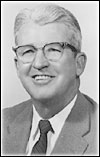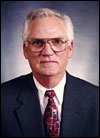If you have an emergency, please dial 800-264-5112 for Dispatch.
It Started With “The REA”
The story of rural electrification has its beginning in Manhattan in 1882, more than half a century before President Roosevelt signed the legislation creating REA. That year, Thomas A. Edison constructed the first central station electric system. It wasn't long afterward that life in the cities and metropolitan areas was indelibly changed by the widespread use of electricity.
But the vast majority of farmers and families living outside of the cities in the rural areas didn't get to experience this wonderful lifestyle conversion. Power companies in the cities could not afford to start building miles of electric lines to serve just a handful of customers. And the rural farmers couldn't afford to pay to have the lines run to them. So even as late as the mid-1930's only one in ten rural homes had electric service.
In 1929, the stock market crash plunged the U.S. into an economic depression unlike any in history. Franklin D. Roosevelt and his New Deal administration enacted several programs to help ease the economic woes of this country, one of which was a program to relieve unemployment-the Emergency Relief Appropriation Act, approved on April 8, 1935. One of the eight categories of projects eligible for funding under this act was rural electrification.
President Roosevelt signed an order on May 11, 1935 creating the Rural Electrification Administration. Morris Cooke was appointed as the first administrator of REA later that month. The primary function of REA was to provide loans to power companies so they could extend their lines into the rural areas. However, only a very few power companies took advantage of these funds.
In 1936 the Rural Electrification Act was signed. This established the Rural Electrification Administration as a lending agency for 10 years and made nonprofit organizations such as cooperatives the main target for receiving the funding.
Today there are about a thousand rural electric cooperatives in the U.S., and more than 99% of America's farms have electric service.
The Birth of South Kentucky RECC
Over the next couple of years, small rural electric cooperatives sprang up all over the country. The first REA loan made to a co-op in Kentucky was made to Henderson-Union RECC in October, 1935. Shortly afterward, farmers in the south-central part of the state began talking about how wonderful it would be to have electricity on their farms.
Their talk culminated on October 8, 1938 when a group of ten farmers from Wayne and surrounding counties met at the County Agent's office in Monticello, Kentucky. Those ten farmers were: W. Dalton, Foxie Dunagan, L.G. Dunnington, R.H. Henninger, J.D. McKechnie, Ray Oatts, G.P. Rice, T.M. Shearer, A.V.Stearns, and W.I. West.
The purpose of the meeting was to officially begin a rural electric cooperative in the area. Articles of Incorporation had already been executed and filed in Frankfort creating South Kentucky Rural Electric Cooperative Corporation, and at this first meeting, by-laws were adopted, seven directors were elected, and the membership fee was set at $5.00.
The business was set up in a rented room in Monticello with one $10.00 per week stenographer, an orange crate file, four cane-bottom chairs, a small table, and no telephone. Membership drives were conducted by the incorporators and others, who gave liberally of their own time. People in Wayne, Clinton, Pulaski, Russell, and McCreary counties were signed up and eight months later on June 10, 1939, the project, having been deemed feasible, was granted a loan by REA. Engineers were then employed and lines were built.
On January 23, 1940, the cooperative celebrated the energizing of its lines and the beginning of its system operation. The first substation, located near Somerset, had a capacity of 600 KVA. Lines from that substation fed the entire South Kentucky system, from northern Pulaski county all the way down to Albany. It was 1946 before a new substation was put into operation at Science Hill, Kentucky.
Leaders
|
Image

South Kentucky owes a great deal of its success today to the co-op leaders during the first few years. Sam J. Hord became manager in 1942 and led the co-op through the war years. During this time, line-building materials and funding were virtually impossible to obtain. Growth was almost at a standstill. Mr. Hord did what line construction he could do and kept the co-op moving along, so that when the war was over, South Kentucky would be in the best possible shape. After World War II, our growth escalated rapidly. During the four years from 1947 through 1950, our membership total and the number of miles of energized electric line increased almost 250%. |
Image

Mr. Schoolcraft faced perhaps the toughest challenges since the rural electrification program began. The first few months of his tenure saw the enactment of the Fuel Adjustment Clause which was brought about by rapidly escalating coal prices. This nearly doubled most of our members' electric bill. And then, just about the time the fuel adjustment started to drop, inflation reached double-digit figures. Compounding the situation further was the need for East Kentucky to add additional generating capacity. What this all amounted to were dramatic rate increases during the late 1970's and early 1980's. |
Image

Mr. Sloan's tenure at the Co-op was marked by rate stability (and even decreases) and innovation. From 1988 through 1999, electric rates declined by more than eight percent. |
Image

Gary Cavitt, who worked as a consultant to several electric cooperatives across the US, succeeded Mr. Sloan. Cavitt served in the position for two years. While in office, he renewed the co-op's mission of “for people, not profit.” |
Image

Anderson, who began working at South Kentucky RECC in August 1978, served as an Energy Conservation Advisor until 1985, when he was made the Manager of Member Services and Public Relations. In April 2000, he was promoted to Chief Operating Officer. |
Image

At that time, Dennis Holt, who was serving as Vice President of Engineering and Operations for the co-op, was named Interim CEO. In January 2018, South Kentucky Rural Electric Cooperative Corporation Board of Directors named Holt as the co-op's new CEO. |
Image

In December 2019, Kenneth E. “Ken” Simmons was hired as South Kentucky RECC’s CEO. Simmons, who began his duties in January, 2020, came to SKRECC as a 38-year veteran of the electric co-op industry. Simmons’ tenure was driven by his focus on being a champion for community involvement and a strong advocate for safety, while also being dedicated to fostering a safe, high-performance culture through caring, commitment, and accountability. He stepped down from his role as CEO in September 2023 to assume the same position at an electric cooperative in his home state of Georgia. His successor was Kevin Newton, who previously served as Chief Operating Officer.
|
Kevin Newton, a dedicated South Kentucky RECC team member for more than 30 years, was named Interim CEO in September 2023, then was appointed as permanent President and CEO of South Kentucky RECC in January 2024. Newton envisions a future for South Kentucky RECC where the cooperative is not just an energy provider, but a cornerstone of the communities we serve. With a deep commitment to ensuring safety, reliability and affordability, South Kentucky RECC aims to deliver exceptional service while keeping the needs of its members at the forefront. |
East Kentucky Power
In 1954, South Kentucky began buying its electricity from a new source. Previously, the commercial power companies had been the only suppliers of electricity to the co-op. But in 1954 East Kentucky Power produced its first power. EKP had been formed in 1941, but, because of the war and some long legal battles with the commercial power companies, did not become operational until the early fifties. EKP was itself a cooperative made up originally of thirteen distribution co-ops in the state (South Kentucky was one of these thirteen). This gave the member co-ops a more dependable source of power than they had previously been able to obtain. We still purchase all of our power from East Kentucky Power.
EKPC supplies electricity through two coal-fired stations: H.L. Spurlock Station located near Maysville and John Sherman Cooper Station located near Somerset.
EKPC also generates power using combustion turbines (CTs) at Bluegrass Station in Oldham County and at J.K. Smith Station located in Trapp, near Winchester. The CTs, which run on natural gas or fuel oil, operate when peak electric demand is highest (usually the hottest and coldest days of the year). In 2003, EKPC became the first utility in Kentucky to generate its own renewable power when it began operating its first plant fueled by methane gas from landfills. Today, EKPC has six landfill gas plants.
EKPC purchases hydropower through Laurel and Wolf Creek dams and the federal Southeastern Power Administration.

